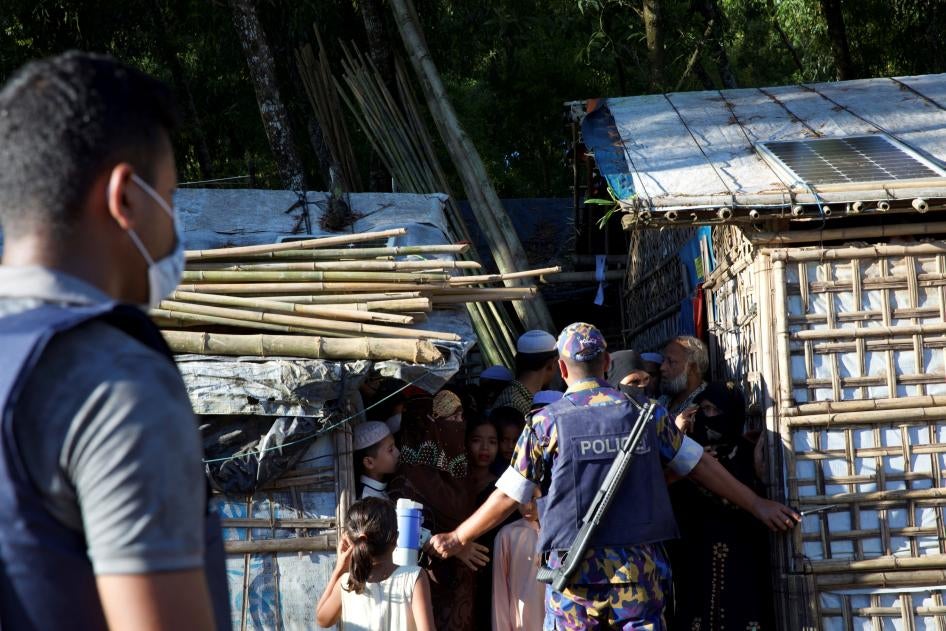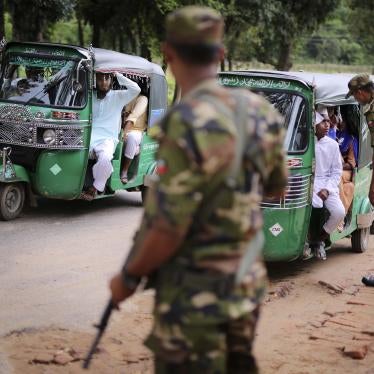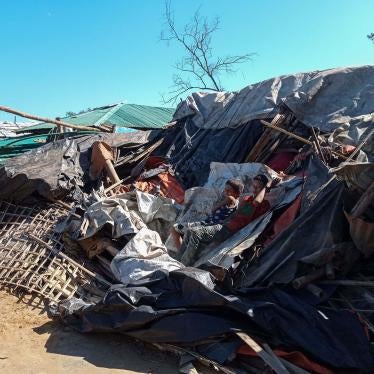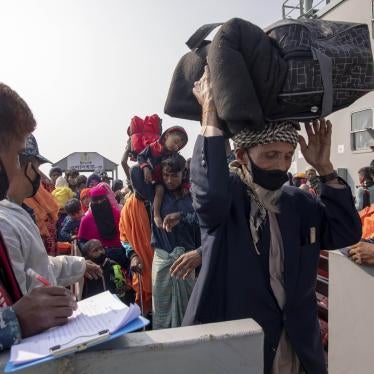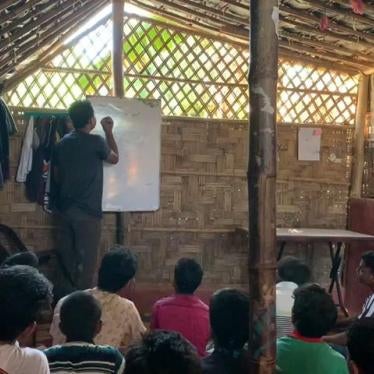(Bangkok) – Bangladesh’s Armed Police Battalion (APBn) is committing extortion, arbitrary arrests, and harassment of Rohingya refugees already facing violence from criminal gangs and armed groups, Human Rights Watch said today. Donor governments should press the Bangladesh authorities to investigate alleged abuses against Rohingya living in refugee camps in Cox’s Bazar, ensure that victims have effective remedies, and develop measures to better protect refugees.
The Armed Police Battalion took over security in the Rohingya camps in July 2020. Refugees and humanitarian workers report that safety has deteriorated under the APBn’s oversight due to increased police abuses as well as criminal activity. Some refugees allege collusion between APBn officers and armed groups and gangs operating in the camps.
“Abuses by police in the Cox’s Bazar camps have left Rohingya refugees suffering at the hands of the very forces who are supposed to protect them,” said Shayna Bauchner, Asia researcher at Human Rights Watch. “Bangladesh authorities should immediately investigate allegations of widespread extortion and wrongful detention by Armed Police Battalion officers and hold all those responsible to account.”
Human Rights Watch interviewed more than 40 Rohingya refugees in October and November 2022 and reviewed police reports, documenting more than 16 cases of serious abuse by APBn officers. These included abuses against 10 refugees who were detained on apparently fabricated grounds for trafficking yaba, a methamphetamine drug, or for violence-related offenses. Human Rights Watch and others have long documented the common practice by Bangladesh security forces of framing suspects with drugs or weapons.
Almost every case Human Rights Watch investigated involved extortion either directly by APBn officers or communicated through majhis, the camp community leaders. Police generally demanded 10,000-40,000 taka (US$100-400) to avoid arrest, and 50,000-100,000 taka ($500-1,000) for the release of a detained family member. Families often had to sell gold jewelry or borrow money for bribes or legal costs. Many worried about the harm to their reputation.
Several refugees were seemingly targeted for information they had shared online regarding APBn harassment of Rohingya. Sayed Hossein, 27, who works as a health volunteer with an international organization and as a citizen journalist, said that on July 25, 2022, at about 10 p.m., around 30 APBn officers arrived at his house, handcuffed him, and confiscated his laptop and flash drive. (Pseudonyms are used to protect the security of interviewees.) He said they told him he was being arrested for posting on social media about an APBn officer harassing innocent Rohingya. They took him to the police camp and demanded a bribe. When his family could not pay 50,000 taka ($500), the APBn officers forcibly photographed him with yaba tablets and sent him to the nearby Ukhiya police station.
“I asked them not to take any photos since it would impact my job and future,” Sayed Hossein said. “They said that because I’m Rohingya, I don’t have any future.” APBn posted the photos on their social media accounts. He was detained on drug trafficking charges and spent 41 days in jail before making bail. He said most of his fellow inmates were Rohingya.
Many of the Rohingya victims work for nongovernmental organizations or as teachers. Humanitarian organizations have raised concerns regarding the impact of APBn harassment on their staff and operations. Another health volunteer paid APBn officers 6,000 taka ($60) after they confiscated his work cellphone and downloaded photos and videos related to armed groups to frame him. “I still remember them smiling when they gave my mobile back,” he said. “In Myanmar, the security forces used to charge us money for anything, any time they wanted. Now in the camps, Bangladesh law enforcement is doing the same thing.”
The APBn officers arrested Soyedul Hoque, 57, in his betel leaf shop on November 2, 2022, and demanded 100,000 taka ($1,000) for his release. “Because we have such little income from the shop, we couldn’t pay the police anything,” his daughter said. He was charged with possession of 2,000 yaba tablets and remains in jail. Human Rights Watch interviewed a witness named on the First Information Report, a formal complaint, who knew nothing of the case or why he was listed.
The APBn crackdown has compounded fear and vulnerability among the one million Rohingya refugees in Bangladesh, the majority of whom fled Myanmar military atrocities in late 2017. The police abuses have escalated amid increasingly coercive restrictions on livelihoods, movement, and education in the camps, including harassment at checkpoints and closing community schools and markets.
The refugees also face threats due to the growing presence of armed groups and gangs. Bangladesh authorities should develop and carry out a rights-respecting security policy, in consultation with refugees, to protect the camp population, Human Rights Watch said. This should include providing comprehensive access to education and livelihoods to reduce illegal and dangerous economic activity.
In late October, the APBn initiated “Operation Root Out” in response to a spike in targeted killings by armed groups. The police have arrested at least 900 Rohingya since mid-2022. But refugees allege that APBn corruption has allowed criminal activity to proliferate, while Rohingya not responsible for crimes have ended up targeted in police crackdowns.
Family members of three Rohingya arrested during Operation Root Out said that the cases against their relatives were fabricated. APBn officers arrested Ali Yusuf, 23, a teacher, on October 29, claiming he had ties to the Arakan Rohingya Salvation Army (ARSA) armed group. His mother met with him at the police camp the next day.
“My son said that a number of Rohingya had been falsely arrested, accused of hoarding weapons like machetes, knives, or firearms,” she said. “He said the police had weapons and drugs in their possession and forced anyone arrested to be photographed to spread rumors about them. He told me not to pay any bribe. The majhi told me that if I paid the police money, he would be released, but I listened to my son.” In the First Information Report, reviewed by Human Rights Watch, Ali Yusuf is accused of possessing homemade weapons. His mother has not yet been able to afford the legal fees.
Several refugees said that ABPn officers beat, slapped, kicked, or otherwise assaulted them, either in detention or at checkpoints. Two were arrested when the police arrived at their homes looking for family members who were not there. Officers arrested Kamal Ahmod, 18, a teacher, on November 2 when they were looking for his father, whom they accused of being an ARSA member.
Kamal Ahmod was sent to jail when his family was unable to pay the 100,000 taka ($1,000) bribe, and later sentenced to one month in prison. “We still don’t know why my brother was sentenced to prison,” his sister said. “My mother went to prison to meet with him yesterday and saw his face was swollen from police beatings. My brother said he was tortured mercilessly.”
Mohammad Alam, 36, an activist who had assembled a list of 149 refugees allegedly abused by APBn officers, was arrested in December 2021 after police found out about the list. “I was put in a single room that looks like an APBn torture cell with equipment like sticks, rods, and electric shock materials,” he said. “They kicked me with their boots every time someone came to interrogate me.” He was released on bail in February 2022.
In some cases, refugees paid bribes that were not honored. APBn arrested a 35-year-old Rohingya man in October 2021. Though his family paid a series of bribes for his release, he remains in jail. His brother, Abul Basher, 23, was arrested on June 27, 2022, and refused to pay the 100,000 taka ($1,000) that APBn officers demanded given his brother’s experience. He paid 30,000 taka ($300) for a lesser charge, which was not upheld, and spent 70 days in jail before securing bail.
Abul Basher said the harassment and extortion has not stopped. “APBn officers keep coming to me and my family asking for bribes,” he said. “They think we are some sort of money machine. How could we pay so much money? There is no way to earn cash. There is no work. We already lost all of our gold to get my bail. We are helpless.”
Rohingya refugees in Bangladesh lack recognized legal status, which puts them on a precarious footing under domestic law and makes them vulnerable to rights violations. The Bangladesh government has a responsibility under international human rights law to ensure that the rights of everyone in its jurisdiction, including refugees, are protected, and to investigate allegations of abuses by government security forces and hold those responsible to account. Restrictions on rights cannot be imposed on a discriminatory basis, including by country of origin.
The authorities should consult refugees and humanitarian groups to improve training and monitoring of APBn units operating in the camps, Human Rights Watch said. Each camp should task and train non-APBn personnel to receive complaints against police officers filed by refugees.
The 2022 Joint Response Plan for the Rohingya humanitarian crisis received less than half of the US$881 million needed for the year. Donors, including the US, United Kingdom, European Union, and Australia, should increase funding to meet the massive protection needs of the Rohingya refugee population.
“The US, UK, and other donors should support projects to promote Rohingya refugees’ safety and protection, while pressing the Bangladesh authorities to end police abuses in the camps,” Bauchner said. “Bangladesh should do what Myanmar never has – hold those responsible for abuses against Rohingya to account.”
|
Report
Bangladesh: Rampant Police Abuse of Rohingya Refugees
Donors Should Press for End to Extortion, Harassment by Armed Police Battalion
Your tax deductible gift can help stop human rights violations and save lives around the world.
Region / Country
Tags
Topic
Most Viewed
-
June 3, 2025
“They’re Ruining People’s Lives”

-
January 25, 2024
“We’re Dying Here”

-
November 25, 2019
A Dirty Investment

-
April 27, 2021
A Threshold Crossed

-
November 19, 2012
Losing Humanity

